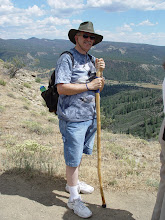I can'tbelieve how long it has been since I posted. I have decided to ressurect this blog and use it for several purposes. One purpose would be to document some geneological information for the Appelhans name as well as others that are related. Another would be to present some "issue" questions I have developed to begin a serious discussion of Christian and American subjects. And finally to document some things that our family does.
One thing that got me to thinking about getting back into doing this was reading a story about the most recent State Roundup of the American Historical Society of Germans from Russia. I don't think most of the family has been too interested in knowing more of our family history. Maybe if I use this blog to include small parts of the story, you might keep checking back to see stories or facts in small amounts. Anyway the story was told by Leona (Wasinger) Pfiefer about a massacre in the village of Herzog in the lower Volga region of Russia. She met a man named Johannes Riedel in Germany soon after the Berlin wall fell and Germany was in the process of being reunited. Johannes was still afraid of the Russians. Anyway, he showed her a drawing on a tablecloth that was a map of Herzog. The story continues: This man, Johannes Riedal, age 84, had drawn a map of Herzog as it was in 1921. In 1919 the village had abundant harvest, enough for the next 10 years. Lenin attacked the farmers and took everything from them - grain, animals, food, seeds for future planting. It was said he wanted to destroy the farmers so people would starve to death. In 1921, corpses of victims of starvation lined the roads. In Mariental a group of farmers revolted against their communist rulers and killed them, throwing the bodies into the deep water. The next day, Herzog revolted. In Graf, all the communists were captured and new leaders elected. The revolt spread to other villages. Finally the communists came, overpowered the people and slaughtered them. In Mariental, many protesters gathered in one building and all 60 of them were shot. Trials were held from village to village with protesters sentenced to a firing squad. In Herzog, the victims were shot right next to Johannes vegetable garden. He saw it all and said it will always be in his memory. The condemned men were marched between 2 rows of soldiers. When they reached the burial spot by the vegetable garden they were stripped to their underware and then they knelt and prayed. Row by row they were shot. It was done calmly and in cold blood, as if the firing squad members had no conscience. These communist exicutioners had no use for anyone. Twenty men and one woman were killed - Riedel remembered the names. We will recognize these last names: Appelhans, Brungardt, Dinkel, Dreiling, Younger, Kuhn, Riedel, Rome, Schoenberger, Weigel, Windholz, Whitman and Anna Terra.
An officer then methodicaly shot each one again. The clothing was given to the soldiers, The head communist examined the dead bodies and realized one was missing - the parish priest. Even though he was not part of the uprising, but was in a neighboring town, he was to die. He was brought in, made to dig his own grave, then shot and killed.
This story Leona had only shared with a few people and finally agreed to tell the 94 people who were at the roundup. It is truly a heart wrenching tale that left a great impact on those present.
It also left a great impact on me, for reading it. The story is what happened to a lot of the family members that did not leave Russia in the late 1800's. Others died in the "gulags" or prison camps in Siberia. I really thank God that our ancestors, (like my great grandfather Johannes,) decided to come to Kansas. Last year at roundup we bought a fiction trilogy by Sigrid Weidenweber called The Volga Flows Forever. I have read the 3 books and Sandy is on the third one now. The titles are "Catherine" "The Volga Germans," and "Gulag to Freedom." They tell a gripping multi generational story of how the Germans came to Russia, learned to thrive on the steppe, and for some to leave, and other to stay behind. I hope this story gives you some sense of what the Germans from Russia went through and would like to learn more. Next post I will give a little family tree back to Russia and talk about when and where they travelled to get here.
Thursday, December 30, 2010
Subscribe to:
Comments (Atom)
